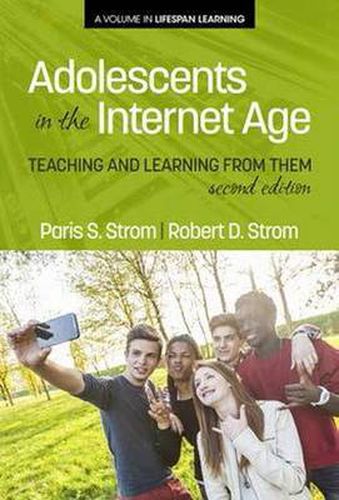Readings Newsletter
Become a Readings Member to make your shopping experience even easier.
Sign in or sign up for free!
You’re not far away from qualifying for FREE standard shipping within Australia
You’ve qualified for FREE standard shipping within Australia
The cart is loading…






This title is printed to order. This book may have been self-published. If so, we cannot guarantee the quality of the content. In the main most books will have gone through the editing process however some may not. We therefore suggest that you be aware of this before ordering this book. If in doubt check either the author or publisher’s details as we are unable to accept any returns unless they are faulty. Please contact us if you have any questions.
Teaching adolescents and learning from them is the paradigm elaborated throughout this second edition of Adolescents in the Internet Age. The premise is based upon four assumptions: (1) Adolescents have unique experiences that qualify them as the most credible source on what growing up is like in the current environment; (2) Adolescents are more competent than many adults with tools of technology that will be needed for learning in the future; (3) Adolescents and adults can support mutual development by adopting the concept of reciprocal learning; and (4) The common quest of adolescents to gain adult identity could be attained before employment.
Expectations are the theme for every chapter. The reason expectations are so important is because they influence goals, determine priorities, and are used to evaluate progress and achievements of individuals and institutions. When teacher expectations correspond with the abilities and interests of students, achievement and satisfaction are common outcomes. In contrast, if teachers expect too little, student potential can be undermined. There is also concern if expectations that students have for themselves surpass their abilities. This occurs if teachers do not inform students about their deficits. Multitasking, doing too many things at the same time, detracts from productivity. Sharing accountability depends upon complimentary and attainable expectations that can be met by students, teachers, and parents. To support appropriate expectations, tthis book for secondary teachers and high school students seeking a broader understanding of their own generation is organized in four parts about aspects of learning and development.
(1) Identity expectations introduce traditional perspectives on adolescence, changes related to sources of learning, evolving emphasis of schools, and ways to support motivation, goal setting, and formation of identity. (2) Cognitive expectations examine mental abilities, academic standards, emergence of the Internet as a learning tool, development of media literacy, creative problem solving, and encouragement of higher order thinking skills. (3) Social expectations explore the need for giving greater attention to social development, importance of teamwork skills, involvement with social networking, adoption of civil behavior, school safety, and values as a basis for ethical behavior and character. (4) Health expectations center on decisions that influence physical health, well-being, and lifestyle choice. Consideration is given to stress management, emotional intelligence, and risk assessment strategies for individual teenagers and the schools that they attend.
$9.00 standard shipping within Australia
FREE standard shipping within Australia for orders over $100.00
Express & International shipping calculated at checkout
This title is printed to order. This book may have been self-published. If so, we cannot guarantee the quality of the content. In the main most books will have gone through the editing process however some may not. We therefore suggest that you be aware of this before ordering this book. If in doubt check either the author or publisher’s details as we are unable to accept any returns unless they are faulty. Please contact us if you have any questions.
Teaching adolescents and learning from them is the paradigm elaborated throughout this second edition of Adolescents in the Internet Age. The premise is based upon four assumptions: (1) Adolescents have unique experiences that qualify them as the most credible source on what growing up is like in the current environment; (2) Adolescents are more competent than many adults with tools of technology that will be needed for learning in the future; (3) Adolescents and adults can support mutual development by adopting the concept of reciprocal learning; and (4) The common quest of adolescents to gain adult identity could be attained before employment.
Expectations are the theme for every chapter. The reason expectations are so important is because they influence goals, determine priorities, and are used to evaluate progress and achievements of individuals and institutions. When teacher expectations correspond with the abilities and interests of students, achievement and satisfaction are common outcomes. In contrast, if teachers expect too little, student potential can be undermined. There is also concern if expectations that students have for themselves surpass their abilities. This occurs if teachers do not inform students about their deficits. Multitasking, doing too many things at the same time, detracts from productivity. Sharing accountability depends upon complimentary and attainable expectations that can be met by students, teachers, and parents. To support appropriate expectations, tthis book for secondary teachers and high school students seeking a broader understanding of their own generation is organized in four parts about aspects of learning and development.
(1) Identity expectations introduce traditional perspectives on adolescence, changes related to sources of learning, evolving emphasis of schools, and ways to support motivation, goal setting, and formation of identity. (2) Cognitive expectations examine mental abilities, academic standards, emergence of the Internet as a learning tool, development of media literacy, creative problem solving, and encouragement of higher order thinking skills. (3) Social expectations explore the need for giving greater attention to social development, importance of teamwork skills, involvement with social networking, adoption of civil behavior, school safety, and values as a basis for ethical behavior and character. (4) Health expectations center on decisions that influence physical health, well-being, and lifestyle choice. Consideration is given to stress management, emotional intelligence, and risk assessment strategies for individual teenagers and the schools that they attend.